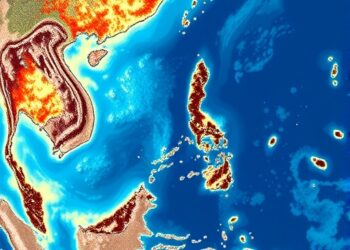In research published in Global Change Biology, investigators examined DNA within ocean bottom sediment cores to assess changes in living organisms within one of the world’s most productive marine ecosystems: the Atacama Trench in the eastern Pacific Ocean, which is located about 100 miles off the coast of Peru and Chile and lies at a depth of up to 5 miles below the surface.
In research published in Global Change Biology, investigators examined DNA within ocean bottom sediment cores to assess changes in living organisms within one of the world’s most productive marine ecosystems: the Atacama Trench in the eastern Pacific Ocean, which is located about 100 miles off the coast of Peru and Chile and lies at a depth of up to 5 miles below the surface.
The study is important because ecosystems around the Atacama Trench have been intensively fished and are affected by climate change. Analyses showed a severe drop in biodiversity from 1970 to 1985 that aligns with one of the strongest known El Niño events, as well as extensive fishing efforts in the area. The researchers also found a direct impact of sea surface temperature on the composition of marine life over time.
“Despite not being recorded in the past, we now understand more about the effects of overfishing and extreme climatic events on marine biodiversity,” said corresponding author Diego Elihú Rivera Rosas, a PhD student at King Abdullah University of Science and Technology, in Saudi Arabia. “We hope that by studying these events in the past, we can anticipate similar scenarios and respond accordingly to protect and save marine life in the future.”
Additional Information
NOTE: The information contained in this release is protected by copyright. Please include journal attribution in all coverage. For more information or to obtain a PDF of any study, please contact: Sara Henning-Stout, newsroom@wiley.com.
About the Journal
Global Change Biology is an environmental change journal dedicated to shaping the future and solving the world’s most challenging problems by tackling sustainability, climate change and environmental protection, food and water safety and provision, as well as global health. The journal exists to promote the understanding of the impacts of global change on biological systems and solutions.
About Wiley
Wiley is a knowledge company and a global leader in research, publishing, and knowledge solutions. Dedicated to the creation and application of knowledge, Wiley serves the world’s researchers, learners, innovators, and leaders, helping them achieve their goals and solve the world’s most important challenges. For more than two centuries, Wiley has been delivering on its timeless mission to unlock human potential. Visit us at Wiley.com. Follow us on Facebook, X, LinkedIn and Instagram.
Journal
Global Change Biology
Article Title
A sedimentary eDNA record of the Atacama Trench reveals biodiversity changes in the most productive marine ecosystem
Article Publication Date
24-Jul-2024




